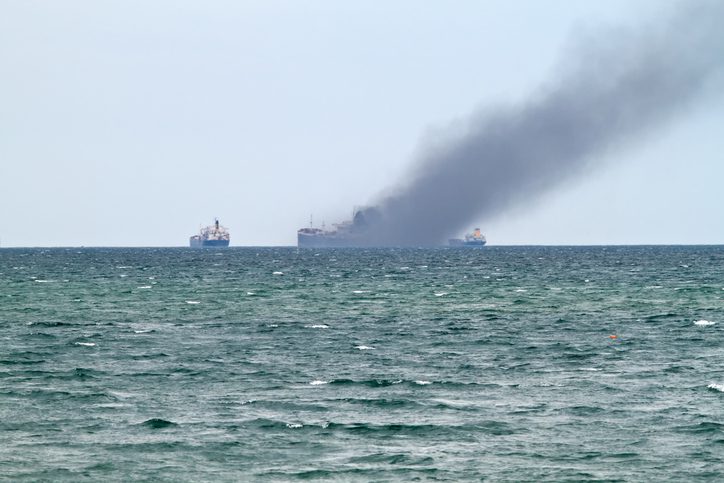NMU publishes lastest War and Strikes Update

The current situation in Ukraine and the related sanctions and export controls are widely known, and many businesses will be unwilling or unable to ship goods to or from the affected region.
War and strikes cover to the region is not automatically available.
Brokers are encouraged to share this update and the information below with cargo policyholders.
For Cargo Insurance policies arranged by NMU, the availability of cover against war and strikes risks is determined by Munich Re Syndicate Ltd (MRSL) by reference to the risk levels within the JCC Cargo Watch List, which are established independently by IHS Markit for the Joint Cargo Committee of Lloyd’s and the IUA (commonly known as “the JCC”).
The geopolitical situation in every country and territory is continually monitored by IHS, and their risk scores are updated monthly, or more frequently if there is particular conflict, unrest or political instability.
There are seven risk levels that correspond to the risk scores:
Low – 0.0 to 0.7Moderate – 0.8 to 1.5Elevated – 1.6 to 2.3High – 2.4 to 3.1Very High – 3.2 to 4.3Severe – 4.4 to 6.4Extreme – 6.5 and higher
The JCC Cargo Watch List was most-recently updated on 5 August 2022, but there were no significant changes.
Corresponding MRSL rate changes take effect from 09:00 GMT on 19 August 2022.
The risk score for Ukraine remains Extreme 6.6. Shipments to this region therefore require prior notification, and we cannot guarantee that war and strikes cover will be available.
Cover
Details of the cover provided against war and strikes risks can be found in the policy wording and/or the applicable Institute War Clauses and/or Institute Strikes Clauses which form part of the policy.
Typically,
War risks means war, civil war, rebellion, insurrection or civil strife. It also includes damage caused by derelict mines, torpedoes, bombs or other weapons of war. War risks are only covered during transit by sea or air.Strikes risks means damage caused by strikers, riots or civil commotions (“SRCC”). It also includes terrorism in the UK.
If countries or territories are in the news because of events like these, then it can be considered likely that exposures will at the very least be subject to additional premium. And in particular, for those classified as Very High, Severe or Extreme by IHS, the availability of war and strikes cover should be checked in advance, as explained below.
Information about risks posed worldwide can also be found at cia.gov/the-world-factbook/
Application
For most countries and territories, NMU premiums are inclusive of MRSL’s basic rate for war and strikes risks cover, the exceptions being:
Where covered, countries and territories for which the Risk Level is Elevated or High may be subject to a surcharge rate typically not exceeding 0.10% and 0.15% respectively.The availability of cover (if any), the terms and conditions and the rate for countries and territories where the Risk Level is Very High, Severe or Extreme is subject to change, and will only be determined at the time of shipment or the attachment of risk; notice to us of any such shipments or exposures is therefore required.In exceptional circumstances, the availability of cover (if any), the terms and conditions and the rate for certain other countries and territories will also only be determined at the time of shipment or the attachment of risk, even though the Risk Level is High; notice to us of any such shipments or exposures is therefore required.
The surcharge rate or the availability of cover (if any) is applied in the following way:
For transits, at the time transit commences.For storage that is not in the ordinary course of transit, if insured, by reference to the most recent update to the JCC Cargo Watch List on an ongoing basis (SRCC cover only).
Full details of the countries and territories within these groups can be found below.
This information is valid until the next change in the JCC Cargo Watch List, which is reviewed every month, or more frequently at times of heightened tension.
Risk Level = Elevated
These countries and territories are typically subject to a surcharge rate not exceeding 0.10%:
ArgentinaBangladeshBrazil3BurundiCongoEgyptEritreaGeorgiaGuineaIndiaIndonesiaIvory CoastNorth Korea1PeruRussia2 (except the region noted below)South KoreaTurkeyVenezuela3
Risk Level = High
These countries and territories are typically subject to a surcharge rate not exceeding 0.15%:
Burkina FasoCameroonColombiaDemocratic Republic of the Congo (formerly Zaire)IsraelKenyaMozambiqueNigerPakistanSudan1
Risk Level = High, Very High, Severe or Extreme
The availability of cover (if any), the terms and conditions and the rate for these countries and territories is subject to change, and will only be determined at the time of shipment or the attachment of risk; notice to us of any such shipments or exposures is therefore required:
Afghanistan1Central African Republic3ChadEthiopiaIran1Iraq1Lebanon3Libya3Mali3NigeriaOccupied Palestinian Territory (being the area defined by the EU and the UN as the Gaza Strip and the West Bank, including East Jerusalem)Persian or Arabian Gulf and adjacent waters including the Gulf of Oman west of Longitude 58°E, in respect of bulk oil and petrochemical products including LNG and LPGRussia2 (within 200km of land border with Ukraine plus Black Sea within territorial waters)Saudi ArabiaSomalia3South Sudan3Syria1Ukraine1Yemen3
Contact us
For more information about war and strikes or cargo insurance, please contact your NMU cargo specialist.
Notes
1 Sendings to, from, within or via this territory is anyway not normally covered unless specifically agreed by us in writing.
2 Sendings to, from or solely within this territory is anyway not normally covered unless specifically agreed by us in writing.
3 Sendings to, from or solely within this territory is anyway not normally covered beyond the port, airport or land border of arrival unless specifically agreed by us in writing.





